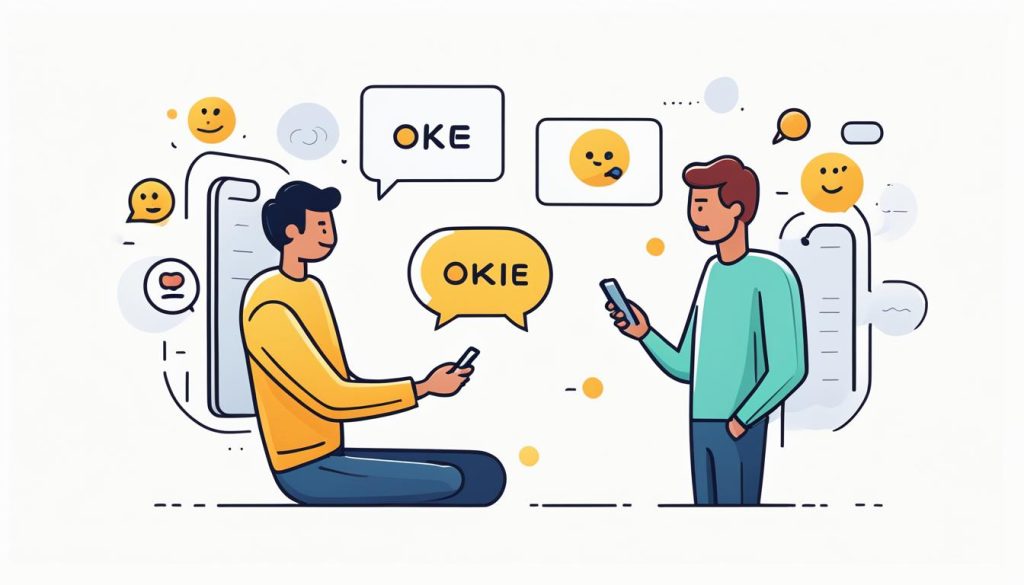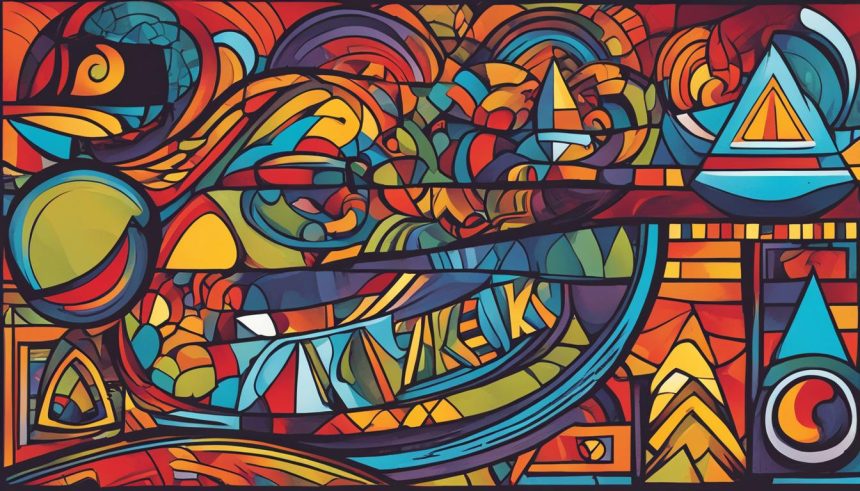As we immerse ourselves in the intriguing world of colloquial language, we often encounter terms that seem to defy time, transforming and adapting to the eras they travel through. The term ‘Okie’ is one such linguistic relic, with its roots deeply entrenched in the American lexicon. Today, we seek to understand what does ‘Okie’ mean, as clarity behind okie slang meaning can add layers to our cultural appreciation and communication. It’s about more than just its okie definition; it’s the embodiment of an evolving language narrative shared by generations, extending from past to present.
- Exploring the Origins of ‘Okie’
- The Roots of ‘Okie’ in American Vernacular
- Transformations of Slang Across Generations
- How Popular Culture Propagates Slang like ‘Okie’
- Unpacking the Modern Usage of ‘Okie’
- What Does ‘Okie’ Mean in Today’s Digital Conversations?
- The Sociolinguistic Impact of Slang Terms like ‘Okie’
- FAQ
- What does ‘okie’ mean in slang?
- Can you provide a brief ‘okie’ definition?
- What is the origin of ‘okie’?
- How has slang like ‘okie’ evolved over generations?
- How does popular culture affect the propagation of slang terms like ‘okie’?
- What is the modern usage of ‘okie’?
- How is ‘okie’ used in today’s digital conversations?
- Why do youth use ‘okie’ as an affirmation?
- What is the sociolinguistic impact of slang terms like ‘okie’?
- Source Links
Key Takeaways
- ‘Okie’ is a historical term with contemporary adaptations in American slang.
- Understanding okie definition requires an exploration of the language’s fluid nature.
- Modern slang, including ‘Okie,’ is commonplace in Gen Z communications and corporate America.
- Examining what ‘Okie’ means today involves recognizing how slang preserves relevance across generations.
- The vitality of slang lies in its capacity to evolve and reflect the zeitgeist of the youth.
Exploring the Origins of ‘Okie’
As we delve into the evolution of American slang, it becomes necessary to trace the linguistic pathways of iconic phrases. The word ‘Okie’ serves as a profound example of such an exploration. Initially coined to describe the inhabitants of Oklahoma during the migration periods of the 1930s, particularly the Dust Bowl era, the etymology of ‘Okie’ allows us to view a snapshot of American history and societal shifts. Let’s examine its journey from its roots to its current status as a piece of living, breathing cultural vernacular.

The Roots of ‘Okie’ in American Vernacular
The term ‘Okie’ has long held a place in American speech. Historically linked to the Oklahomans who were forced to depart their homes in search of better opportunities, the meaning of ‘Okie’ was synonymous with the struggles and hardships faced during the drought and economic despair of the 1930s. These migrations imprinted ‘Okie’ deeply into the American narrative, embedding a rich backdrop to the okie slang definition we explore today.
Transformations of Slang Across Generations
Slang operates much like a living organism, adapting to the environment around it to survive and thrive. In essence, every emerging generation molds the existing language to fit their unique cultural landscape. So, while the origin of ‘Okie’ is well-documented, its representation in speech has morphed over the years. From a term describing migrants from Oklahoma, it has been embraced and altered across generations to represent characteristics far beyond geographical implications.
How Popular Culture Propagates Slang like ‘Okie’
Popular culture acts as a powerful conduit for the propagation and evolution of slang terms. Through music, television, and now the vast reach of social media, phrases such as ‘Okie’ find new life and contexts distinct from their origins. As new artists and influencers emerge, so too do fresh interpretations and usages of longstanding jargon. In every chord and scene lies the potential for rejuvenation of terms like ‘Okie,’ transforming them from historical markers to symbols of the current zeitgeist.
- Origin of ‘Okie’: A historical nickname for Oklahomans during the Dust Bowl era.
- Current Slang Metamorphosis: Generational shifts in meaning, departing from geographical origin.
- Popular Culture’s Role: Media and arts as catalysts for sustaining and reinterpreting ‘Okie’.
Unpacking the Modern Usage of ‘Okie’
Exploring the modern landscape of language, we find that the term ‘Okie’—much like a chameleon adjusting to the surrounding environment—has undergone a metamorphosis. Once pinpointing the residents of a specific state, ‘Okie’ now mingles within the vast sea of expressions that Gen Z claims as its own. These descendants of the technological era have crafted an entirely new lexicon that includes terms like ‘bet’, ‘cringe’, and ‘sus’, a lexicon that’s constantly reflecting the swift currents of societal and digital progression.”

Amidst this evolutionary process, the okie word meaning continues to be as dynamic as the generation wielding it. To fully grasp the okie meaning, we listen to the voices of youth, who often serve not just as language adopters but as its enduring curators. As agents of change, Gen Z shapes slang to suit their cultural narratives, and in doing so, they redefine and sustain words from one generation to the next.
Within this linguistic shift, *’Okie’* stands not as a relic of the past, but as an active participant in everyday communication among young people. The question that surfaces is no longer solely, “What does ‘Okie’ mean?” but “How does ‘Okie’ mean?”—a query taking into account not just definition, but usage, context, and cultural tapestry.
- Historical Perspective: ‘Okie’ as a label for Oklahoma migrants.
- Contemporary Conversation: ‘Okie’ as a versatile term in Gen Z’s dialogue.
- Cultural Relevance: ‘Okie’ encompassing new meanings within evolving societal contexts.
In conclusion, the okie mean in conversation today is a testament to the fluid nature of language itself. This term, embedded in rich American heritage, has proven its resilience as it adapts to the nuances of the modern world. By acknowledging these modifications, we appreciate the expansive continuum upon which slang travels, knowing that our understanding is as ever-changing as the very words we analyze.
What Does ‘Okie’ Mean in Today’s Digital Conversations?
In today’s digital era, our linguistic inventory continually expands with catchphrases and colloquialisms that reflect emerging trends and cultures. Within this dynamic cyberspace, the word ‘Okie’ has taken on a life of its own.

Particularly among the youth, okie slang traces its usage far beyond its geographical roots, developing into a term that encapsulates a degree of acknowledgement or agreement within the hive of online discourse.
From Texts to Tweets: ‘Okie’ in Cyberspace
Across various messaging apps and social platforms, ‘okie’ emerges as a marker of cultural savvy. It’s nestled in tweets, direct messages, and even in the playful banter across gaming streams. ‘Okie’ exists as a slice of digital vernacular that vivifies the spoken word in a virtual text bubble. Its evolution has become emblematic of how Gen Z creates and commands its own linguistic terrain; reengineering traditional okie slang for rapid and resonant communication.
‘Okie’ Used as an Affirmation Amongst Youth
Witnessing language in motion, ‘okie’ often assumes the role of a casual affirmation, embedding itself in the everyday jargon of Gen Z. Much like the affirming ‘bet’ or the skeptical ‘sus’, ‘okie’ denotes a sense of assent or recognition that okie mean in today’s digital conversations is far more complex and nuanced than its initial definition. Through the whispers of text threads and the scrolls of timelines, ‘okie’ thrives as a living link to the past, reanimated in the digital pulse of the present.
The Sociolinguistic Impact of Slang Terms like ‘Okie’
As we navigate the profound sociolinguistic impact of slang terms, it’s pivotal to engage with how phrases like ‘Okie’ permeate our interactions and lay the groundwork for a rich linguistic tapestry. This okie slang meaning has blossomed from its historical roots to a term indicative of affirmative response and comprehension in today’s digital domain. It’s a symbol, a signature of the cultural zeitgeist that pulsates through various age cohorts, offering more than a nod of acknowledgment; it’s a bridge to collective identity.
In our examination, we discover that the sociolinguistic impact of slang terms goes well beyond the realm of casual communication. Slang, including ‘Okie’, serves as an integral part of the framework that shapes dialogue, fortifies group solidarity, and telegraphs social dynamics. It’s a reflection of the times, revealing layers of cultural complexity concerning power relations and the ongoing conversation about cultural appropriation. These snippets of language extend far more than mere vocabulary—they encode our aspirations, struggles, and the evolving continuum of socio-political consciousness.
Therefore, when we speak of the okie slang meaning, we’re engaging with a cultural phenomenon that has inscribed itself into the annals of sociolinguistic evolution. The affect that slang like ‘Okie’ has, elegantly woven into the fabric of society, bolsters the resilience and adaptability of language itself. It confirms that words can both honor their origins and forge new identities within modern vernacular. Ultimately, the sociolinguistic impact of slang terms is a vibrant illustration of how intimately words can shape—and be shaped by—the societies they inhabit.
FAQ
What does ‘okie’ mean in slang?
‘Okie’ in modern slang often functions as a casual, informal acknowledgment or affirmation, akin to saying “okay” or “alright.” However, the meanings may vary based on context and the speaker’s intention.
Can you provide a brief ‘okie’ definition?
Originally, ‘Okie’ referred to a resident or native of Oklahoma, especially one that migrated west during the Dust Bowl era. Today, while it can still hold that meaning, it has also been adopted into slang, where it simply signifies agreement or recognition.
What is the origin of ‘okie’?
The term ‘Okie’ has its origins in the 1930s, referring to migrants from Oklahoma who moved to other regions during the Great Depression, specifically during the Dust Bowl phenomenon. That historical association shaded its early uses.
How has slang like ‘okie’ evolved over generations?
Slang naturally evolves with each generation, reflecting current societal trends, cultural shifts, and technological advancements. A term like ‘okie,’ steeped in historical context, has transitioned to find its place within the vernacular of later generations, particularly among the youth.
How does popular culture affect the propagation of slang terms like ‘okie’?
Popular culture, through media such as music, movies, and television, often adopts and amplifies slang terms, spreading them beyond their original contexts and introducing them to wider audiences. As a result, terms like ‘okie’ often gain new life and meaning in popular discourse.
What is the modern usage of ‘okie’?
In modern usage, ‘okie’ typically signifies agreement or is used as an informal response akin to ‘okay.’ It may also be used as a light-hearted, friendly greeting among friends, reflecting its versatile adaptation in contemporary slang.
How is ‘okie’ used in today’s digital conversations?
In digital conversations, ‘okie’ is often used as a quick and informal way to acknowledge a message or agree with a statement. It is prevalent in text messages, social media, and other online platforms where brevity and speed are valued.
Why do youth use ‘okie’ as an affirmation?
The youth use ‘okie’ as an affirmation to convey acceptance, understanding, or consent in a casual manner. It helps establish an in-group identity, foster camaraderie, and maintain a quick and informal tone in communication.
What is the sociolinguistic impact of slang terms like ‘okie’?
Slang terms like ‘okie’ showcase the dynamism of language and mirror social identities, group dynamics, and cultural trends. They influence how communities communicate and interact, often highlighting generational divides and societal changes.
Source Links
- https://www.usatoday.com/story/tech/columnist/2018/08/10/ultimate-guide-understanding-teen-slang-and-text/936280002/
- https://www.redding.com/story/entertainment/2023/12/21/delulu-rizz-sus-the-best-gen-z-slang-and-what-it-all-means/71987321007/
- https://abc3340.com/news/local/decoding-teen-text-messages-the-double-meaning-behind-the-slang-terms-texting-teenagers-code-online-predators-gaming






